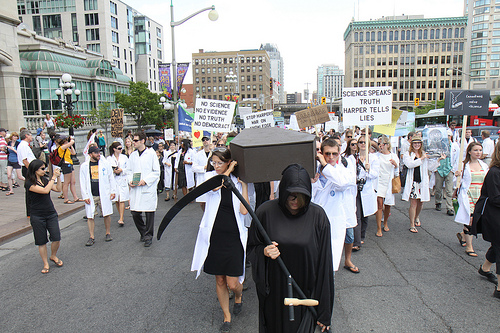By MiningWatch interns Brigette DePape and Priyanka Vittal
“What do we want? Evidence based decision-making. When do we want it? After peer review!” chanted a line of doctors at the Death of Evidence rally, marching beside upwards of one thousands scientists, doctors, lawyers, and concerned citizens. What fuelled such an outcry from the science community, not known for taking it the streets? Unabashed cuts and pronounced changes to research, and the related neglect of evidence based policy-making, in favour of a neo-liberal agenda. As interns with MiningWatch, staying in the office on Tuesday was not an option: these changes will deeply affect mining issues such as water protection and the environmental assessment of mining projects so we took to the streets to show our support for the scientists.
Organized by members of the scientific community (including PhD candidate Katie Gibbs and Dr. Scott Findlay from the University of Ottawa) and hot on the heels of a series of direct actions against cuts to refugee health care, participants donned white lab coats to represent the pursuit of scientific knowledge. A coffin was carried through the procession representing the death of evidence based policy making while placards read creative messages such as: “No science, no evidence, no truth, no democracy” and “Stop the Infocide”, to name a few.
The scientists decried the cuts to the Experimental Lakes Area -- a program created to understand and monitor the human impact on lakes and watersheds; and to develop appropriate strategies to preserve and restore ecosystems. The closure comes at a troubling time when the threats and pressures on Canada’s aquatic ecosystems are at an all time high – including many new mining projects and some new types of mining and mineral processing never before done in Canada (chromite and rare earth elements). To add to the threats – the Fisheries Act, Canada’s longest standing and most important water protection law has been gutted.
The drastic overhaul of the Environmental Assessment process were also denounced. Now fewer projects will be assessed, reviews will be subjected to restricted timelines and public participation will be limited, including limited consultations with Indigenous Peoples. Reviews may also be handed off to the provinces. This could mean the overall oversight of mining projects may be diminished. Changes to the Environmental Assessment process with Bill C-38 calls into question whether MiningWatch can participate in the federal review process and provide a trusted independent voice.
The government is clearly targeting scientists and their quest for evidence to inform decision making, from the muzzling of scientists, cuts to Environment Canada, to ending the work of National Round Table on the Environment and the Economy (NRTEE) for purely political reasons.
Although not mentioned at the rally, another concern has been the trimming of Environment Canada’s monitoring and oversight of a program designed to help the mining industry meet emission standards. Minister of the Environment Peter Kent, justified reduced funding for the Environmental Effects Monitoring program (EEM) on the basis that “the program is no longer needed now that the program is over a decade old and has widespread high levels of compliance". Neither of these claims stand true, as evidenced from a review of performance of the Metal Mines Subject to the Metal Mining Effluent Regulations in 2010, as well as the 2nd national assessment conducted in 2012.
Compliance rates are quite uneven across the country, and that even with relatively high compliance rates (on average), the EEM program has shown "significant" changes to downstream aquatic ecosystems - both the fish themselves and the aquatic inverts. What’s more, the pollution thresholds are based on compromises with industry about what they thought was possible and have not been updated since the 70s. Though it's not a regulatory requirement to pass the test, companies are required to test the toxicity of their effluent on water flea, an indicator species. Many of the mines fail this test.
The government’s cuts mark not only an ideological neglect of science, but discrimination against the perspectives and knowledge of Indigenous Peoples and marginalized groups. Ben Powless, an Indigenous activist who recently returned from Rio +20 Earth Summit in Brazil, eloquently explained that the government is not only ignoring climate science with its unfettered expansion of the Tar Sands, it is also ignoring and berating Indigenous knowledge, where Indigenous Peoples have seen for years the impacts of climate change on ecosystems, and have been at the forefront of defending them.
Speakers also shed light on the government’s broader cuts that will negatively impact human health and rights. Other changes include the controversial changes to immigration and refugee policy and the restrictions on charities limiting their advocacy capacities. It is also rumoured that the Species at Risk at will be on the chopping block when Parliament returns on September 17 .
The “death” of evidence-based policy-making will affect an array of sectors, including mining. These changes could diminish our understanding of the effects of mining on the environment and stonewall advocacy organizations that deserve a voice in regards to mining activity.
With regulations and consultation from communities and independent research with respect to mining projects on the chopping block, also on the chopping block will be our lakes, our air, our environment, and our health.
